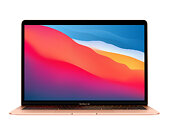Thursday, November 12th 2020

Apple's M1-Based MacBook Air Benchmarked
When Apple announced that they are going to switch their Mac lineup from Intel-based x86 processors to the custom "Apple Silicon," everyone was wondering how the new processors will look and perform. To everyone's luck, Apple has just a few days ago announced its first Apple Silicon custom processor for MacBook. The M1, as the company calls it, is their first processor designed for higher-power and performance tasks The M1 features eight CPU cores (four high-performance and four-high efficiency) paired with eight cores dedicated to the graphics. On the die, there is also a 16-core neural engine made to accelerate machine learning tasks found in the new applications.
Today, we are getting the first GeekBench 5 CPU benchmarks that showcase just how far Apple has come with its custom design. What we have is the M1 processor found in MacBook Air. This Mac model features a passive cooling system, cooling a CPU with a base frequency of 3.2 GHz. The system scored 1719 points in the single-core result, and 6967 points in the multi-core result. The single-threaded results measure itself with some of the highest-end offerings from Intel and AMD, while the multi-threaded results are very good given the mix and match of small and big cores.
Source:
GeekBench 5
Today, we are getting the first GeekBench 5 CPU benchmarks that showcase just how far Apple has come with its custom design. What we have is the M1 processor found in MacBook Air. This Mac model features a passive cooling system, cooling a CPU with a base frequency of 3.2 GHz. The system scored 1719 points in the single-core result, and 6967 points in the multi-core result. The single-threaded results measure itself with some of the highest-end offerings from Intel and AMD, while the multi-threaded results are very good given the mix and match of small and big cores.


117 Comments on Apple's M1-Based MacBook Air Benchmarked
Shows the M1 as the fastest Single threaded CPU in Geek Bench.
browser.geekbench.com/v5/cpu/singlecore
Which means the results are heavily influenced by the OS. Compared to those, the 1700 result from the M1 also in MacOS is way less impressive.
But in the end it is still a great processor with really good performance* and amazing low power consumption. It’s indeed a formidable opponent for both Intel and AMD, at least on this segment. They still have to show how well it scales, but I’m confident they will also be competitive there in a couple of years.
*my prediction for cinebench r23 is 1300-1400 single core and 6000-6500 multi core. Graphics will probably be on par with the new Intel Xe.
Unfortunately in the real world it is very likely that this simply means increasingly walled walled garden of Apple.
I do hope machines have enough access that custom OS can be easily booted and SoC along with each part of it are well documented and supported - for example in Linux or FreeBSD. This hope probably means I am a fool...
How do you air benchmark a laptop? :wtf:
Simple questions Geekbench can never answer or shine light on: " how capable is thr device at X or Y" in terms of real use cases.
That alone makes it pure synthetic... but then why does every version effectively invalidate all scores before it?
Some benchmarks just exist as industry marketing machines and geekbench is a sorry attempt at such a thing. It suits the mobile progress crowd, stuck in more or less walled gardens and stuck in an online reality by design. The moment ARM cpus start becoming real CPUs for multitasking on varied stuff, they dangle along the bottom end of laptop CPUs in most real scenarios. They lose their efficiency edge or run into power limits. Benches dont show that.
For me the main limitation that remains is the lack of eGPU and the 16GB memory limit as for a lot of tasks faster, lower latency, higher bandwidth RAM is no substitue for more RAM.
Their new series will be bunch of glorified tablets.
It will do great for Apple for one they will able to distance themselves from apple to apple comparisons to the PCs as they are lower spec'd but higher priced, and they will get away from that by building a whole line of products that will be even lower spec'd. Pure Genius!
None of this matters as the Apple users don't care about any of that they just want the glitter.
Will it run autocad?
So while it looks great for photo editing and hardware video encoding, it's not the "king" for brute force 3D rendering. I wonder just how much more performance a desktop m1 could tap into to get on the same level as zen 3 ?
Good benchmarks 'change' neutrally, and if they don't, they are a new sort of benchmark.
3DMark versions present different loads and are up front about it. They test against an API and they present new tests to stress different parts of it. Unigine gives us a new benchmark for every different type of stress test. You see version changes, that add options. But the bench itself remains the same.
Geekbench is nothing like that, especially not in how it is handled. Compare it to how we handle Cinebench results. Versions are noted with each one because there are some differences. Geekbench scores are one big clusterfuck in that sense. Geekbench is just one big score that is supposed to tell us... ehm... what exactly? And it won't even have value in relative score comparisons because new versions completely change them across the board. So what's the actual use of a Geekbench score in practice?
Results are out... and it's really good, a bit better than expected!
What's the source of this, by the way?
Are they referring to different processors?